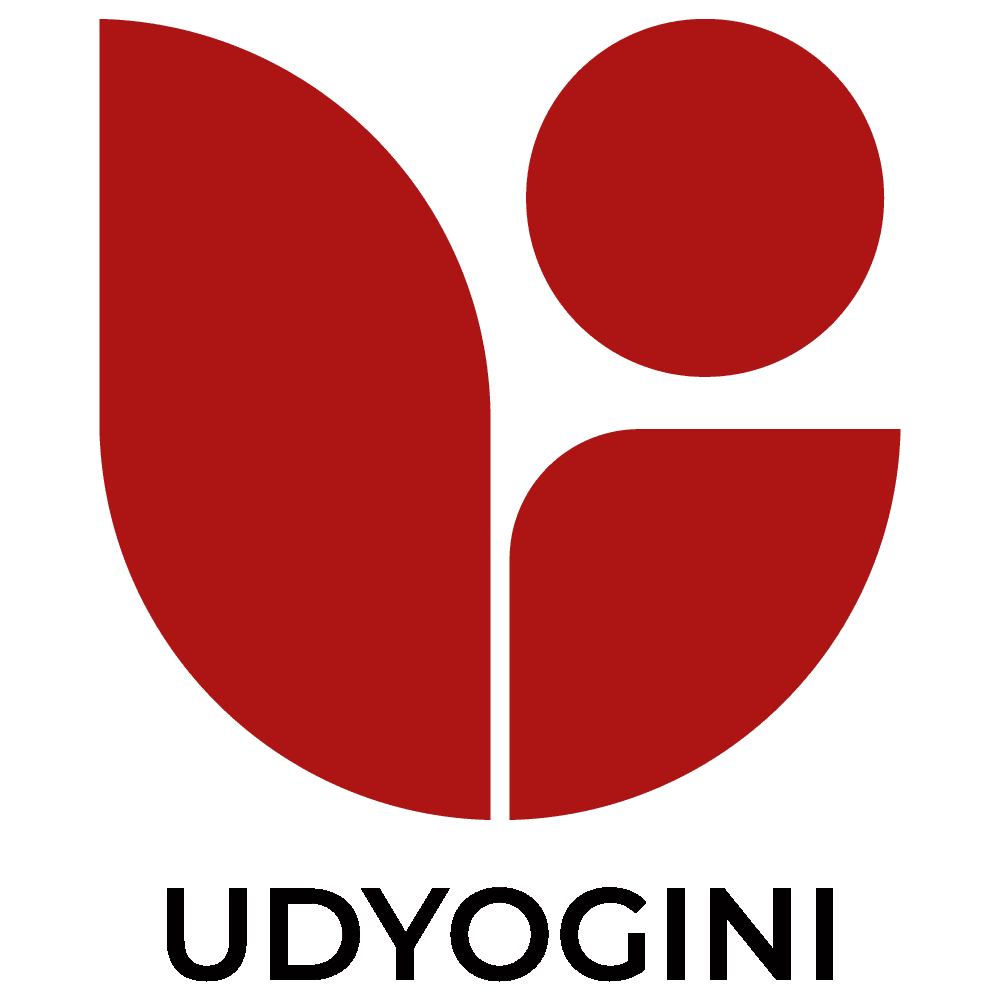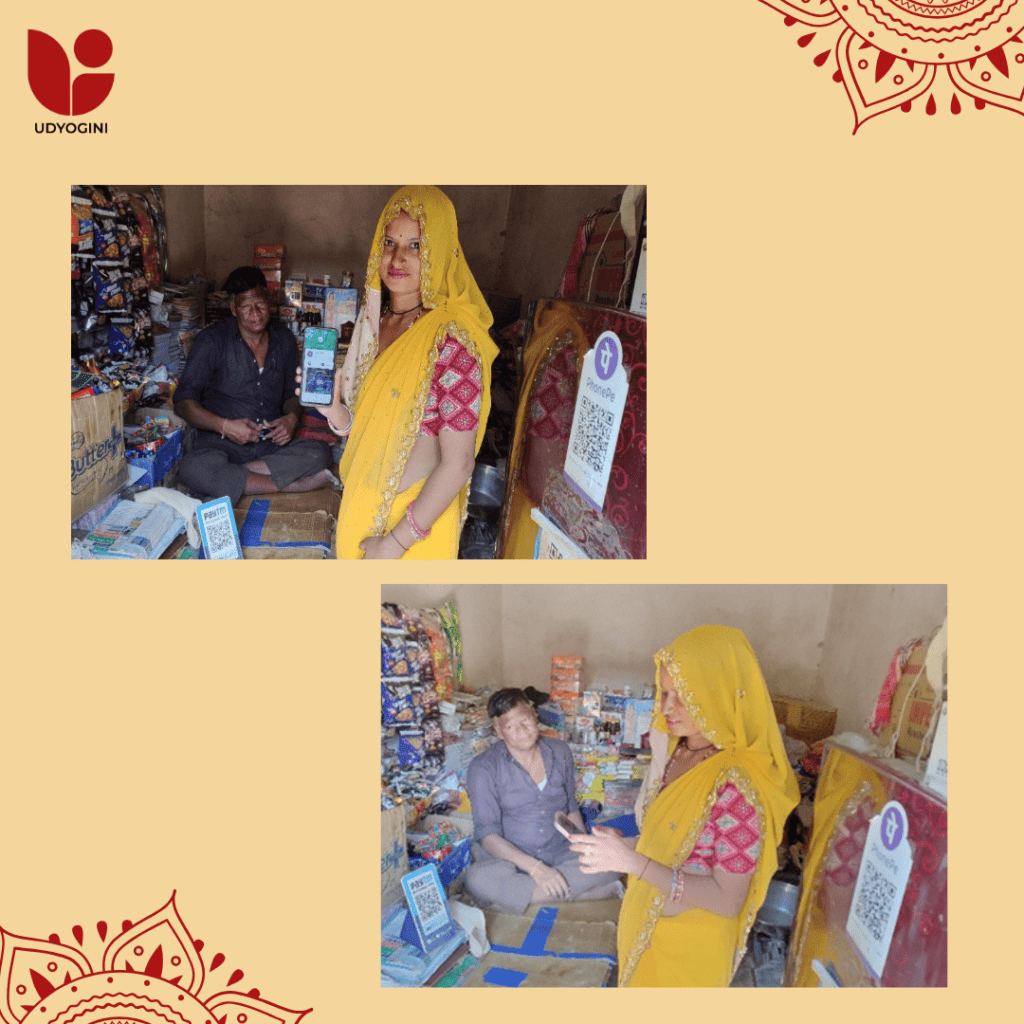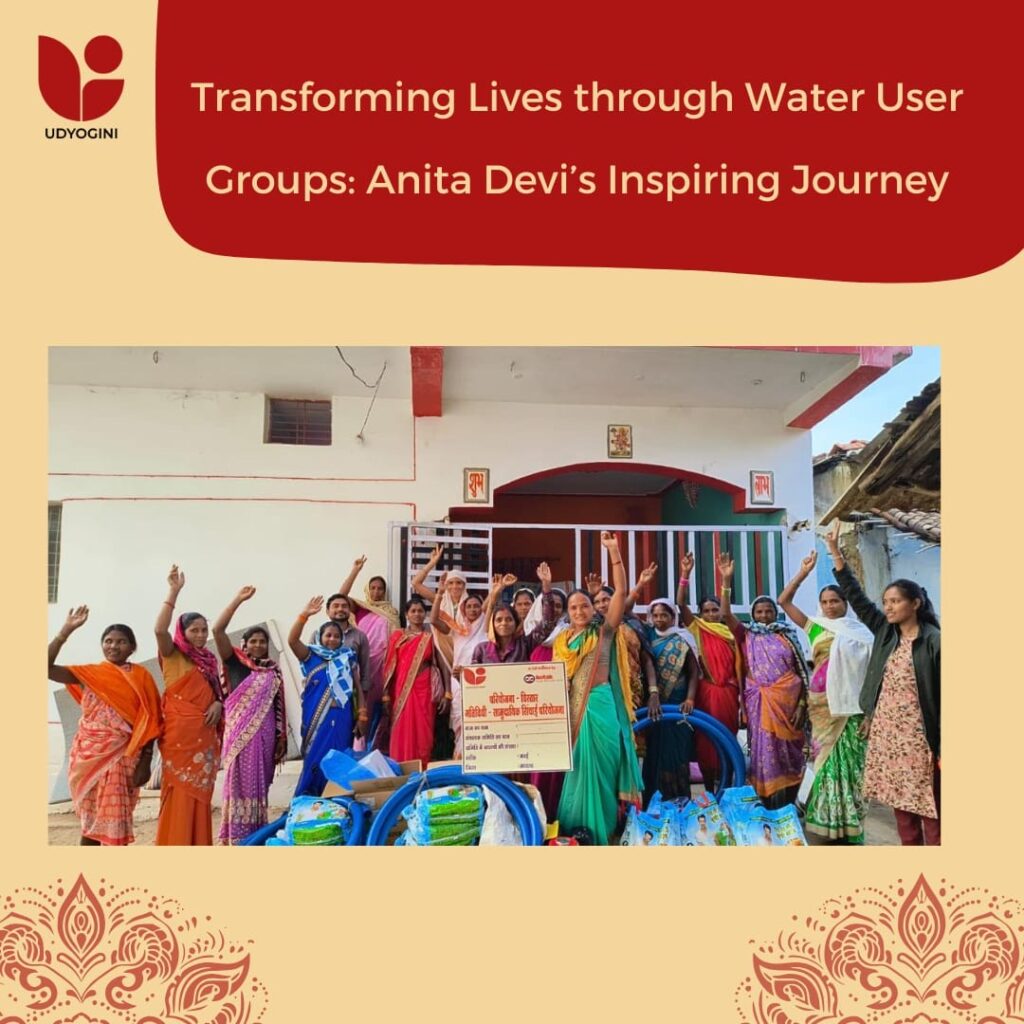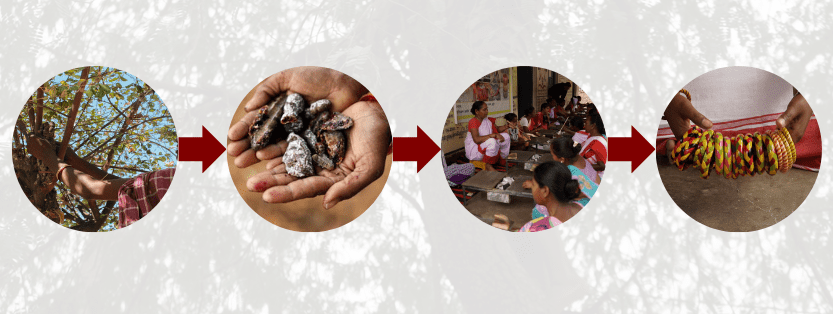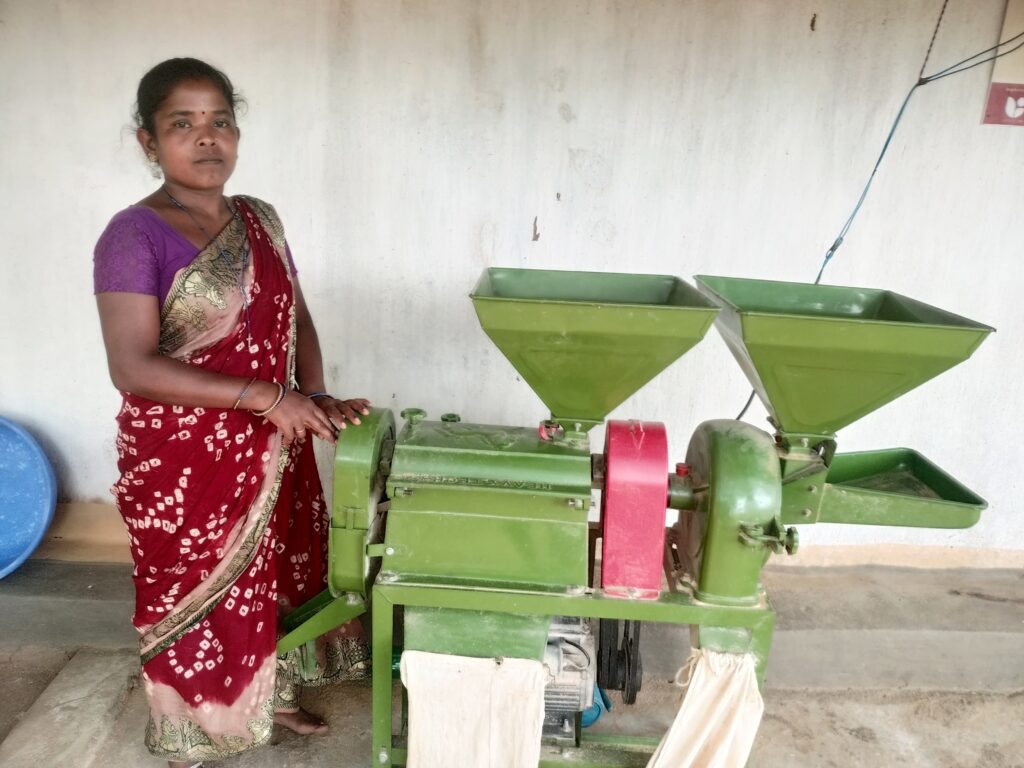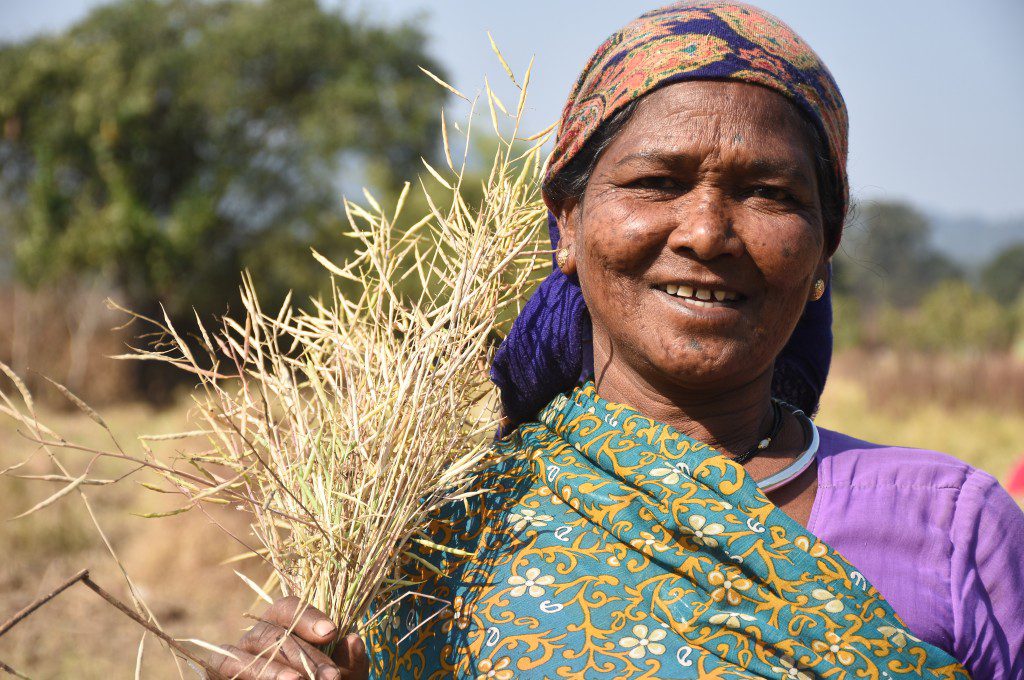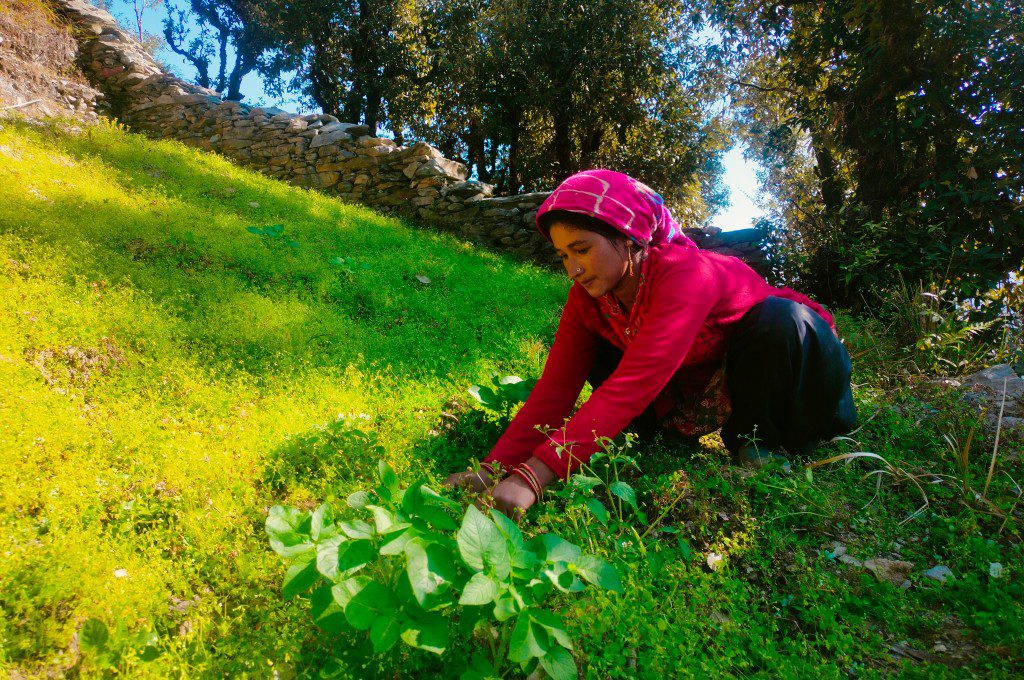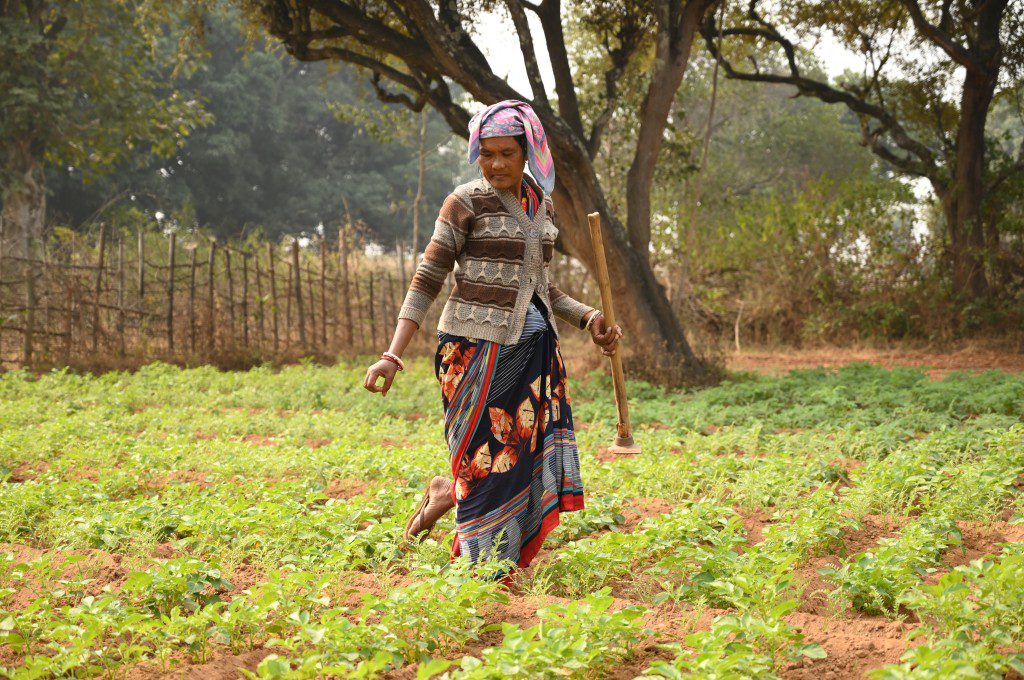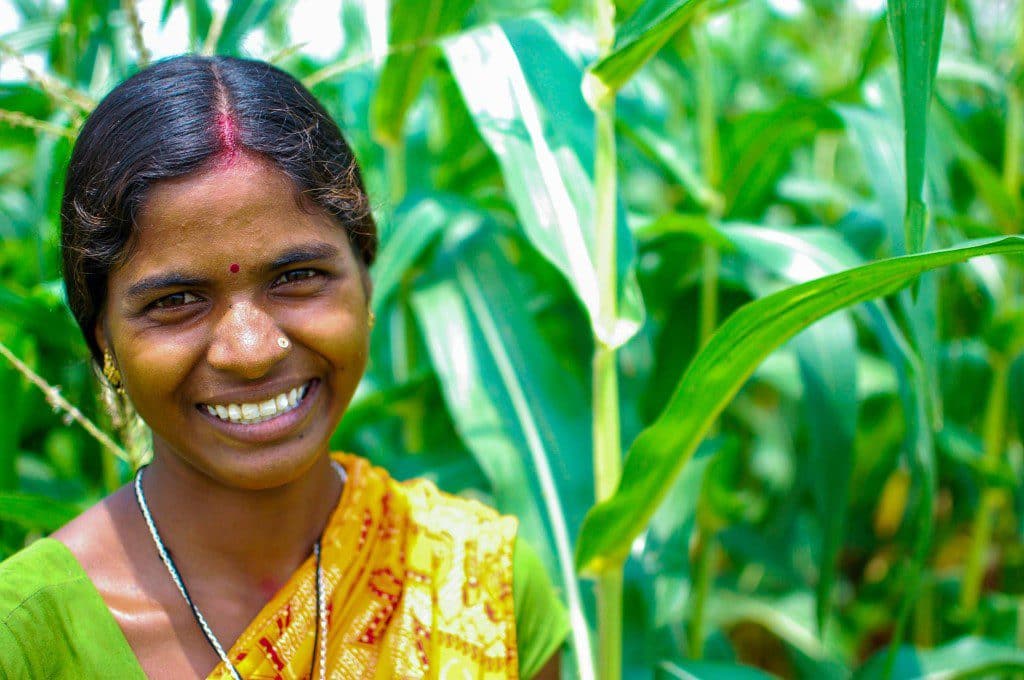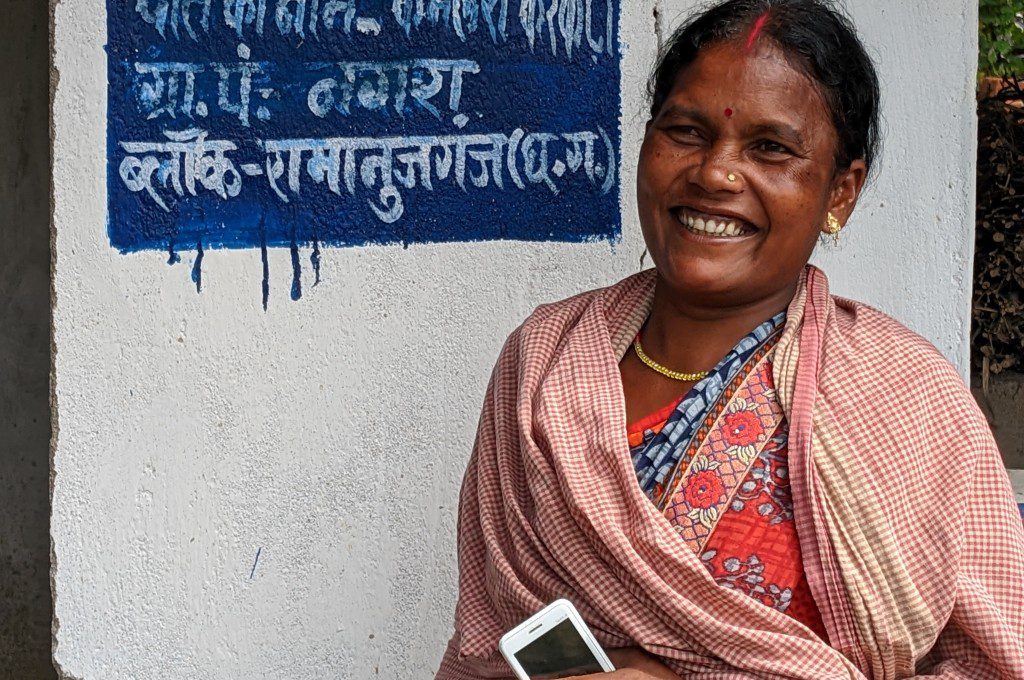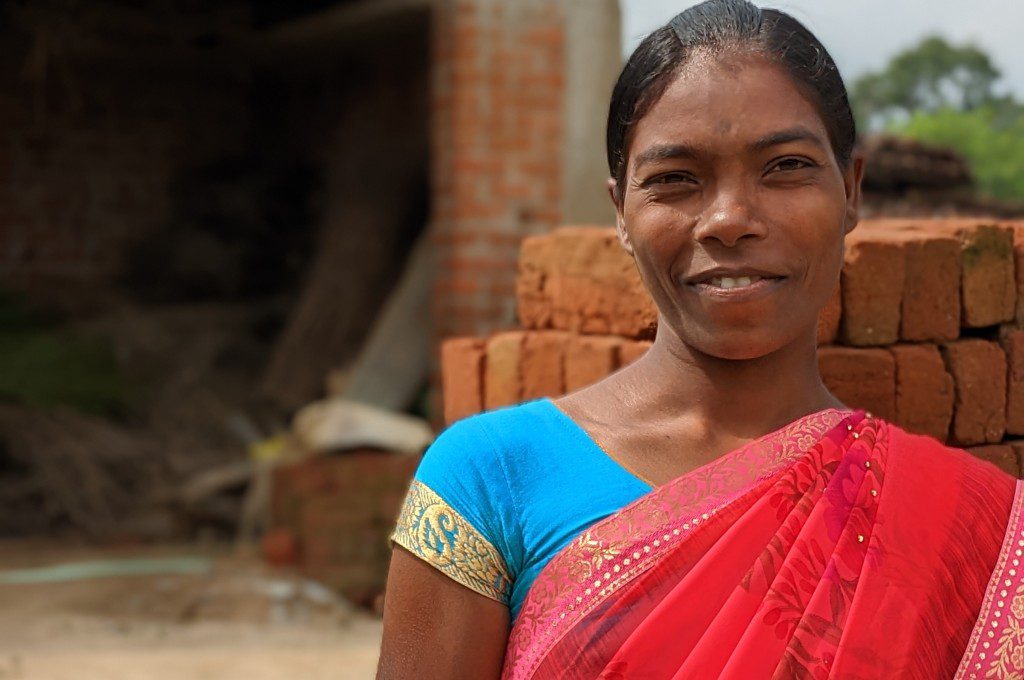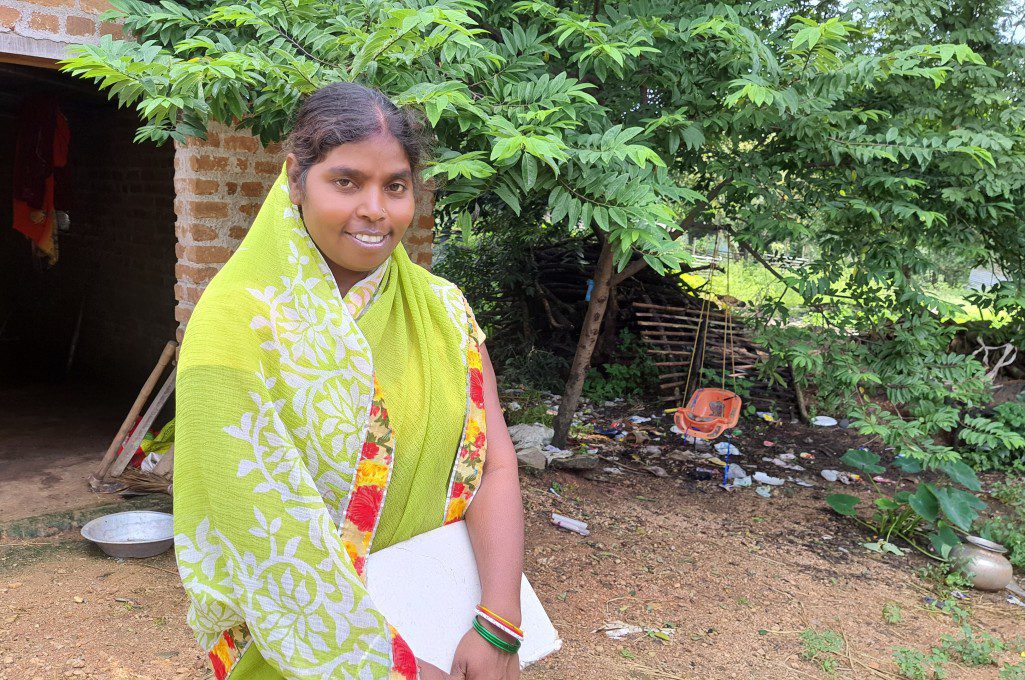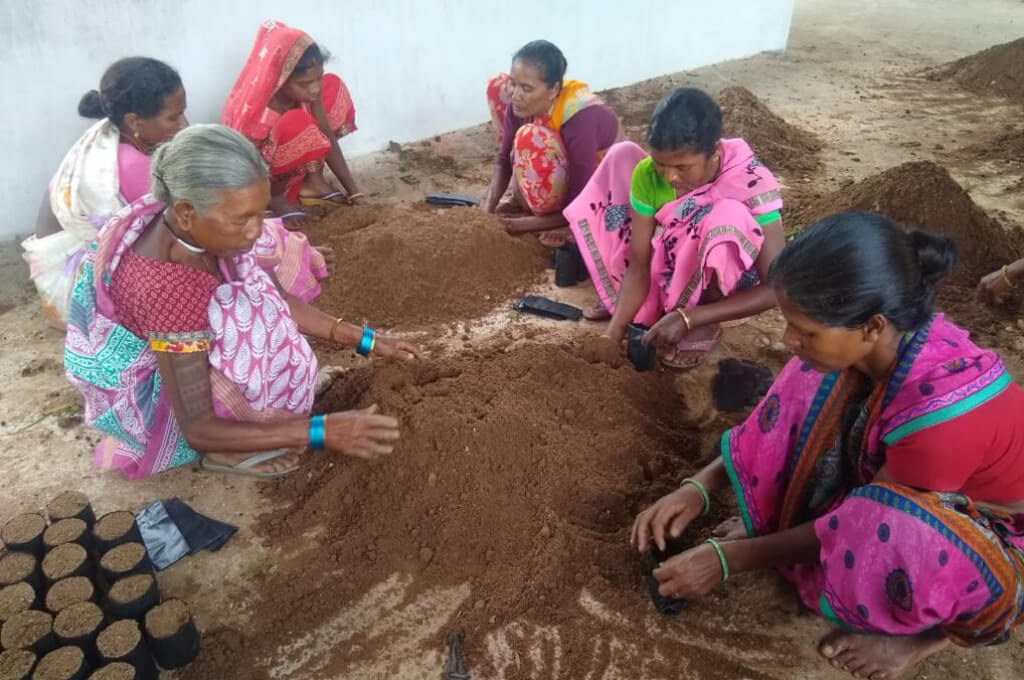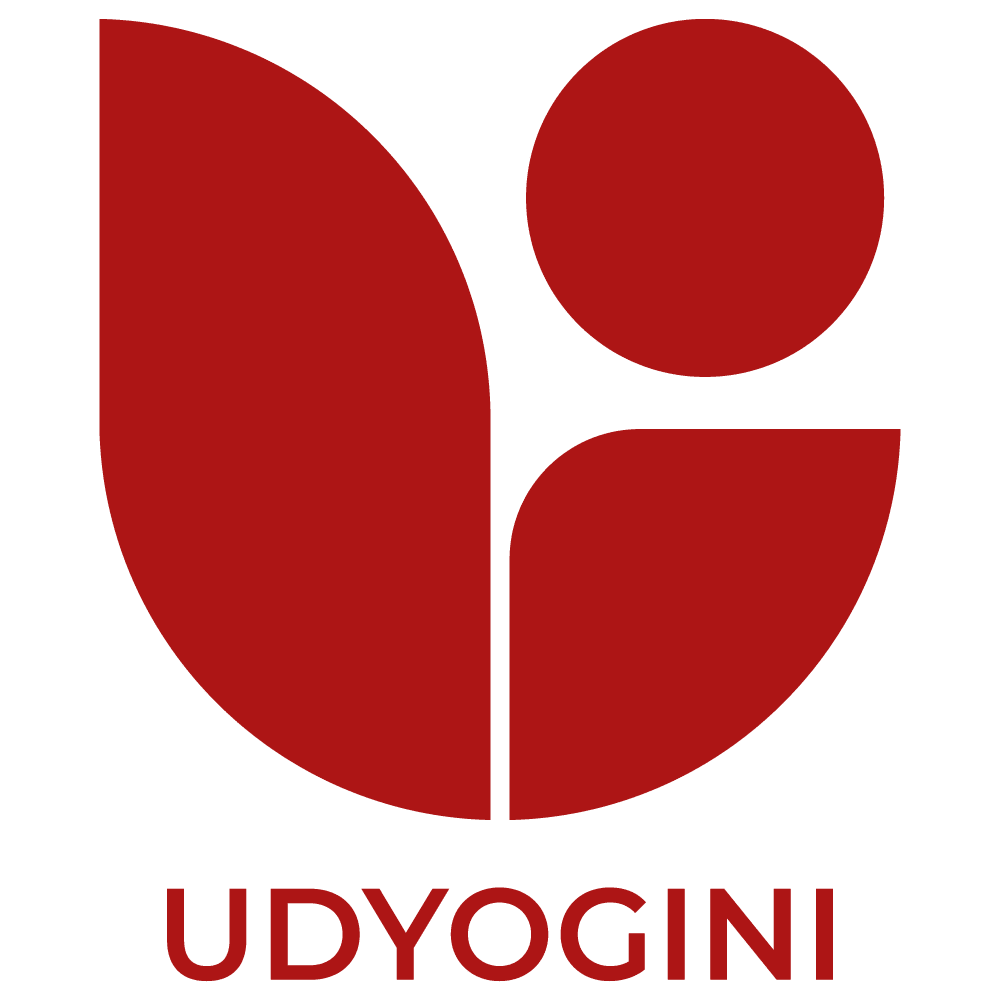Stories of Change
Poshan Vatika: Growing Health & Nutrition
Nutrition Garden: Cultivating Health and Empowerment The Nutrition Garden initiative is a powerful step toward ensuring Didis have access to fresh, chemical-free food while gaining self-sufficiency in nutrition. By growing their own vegetables, fruits, and medicinal plants, women can take charge of their health and well- being. Addressing Nutritional Gaps with Homegrown Solutions Many rural families struggle with a lack of nutrient-rich food, leading to health issues like anemia and malnutrition. By encouraging women to cultivate small home gardens, this initiative provides an accessible, sustainable solution for a balanced diet. What is a Nutrition Garden? A Nutrition Garden is a small, well-planned home garden where families grow diverse, nutrient-rich crops. It ensures a steady supply of essential vitamins and minerals, improving overall health while promoting organic farming practices. Why This Initiative? The primary goal is to make nutritious food readily available while empowering women through self-sufficiency. By growing their own produce, Didis reduce dependence on external food sources and improve their family’s diet with fresh, homegrown ingredients. How It Works To establish successful nutrition gardens, women receive training and support in: 1. Selecting Nutritious Crops: Growing iron-rich leafy greens like spinach, vitamin-packed vegetables like tomatoes, and medicinal plants that boost immunity. 2. Soil and Organic Composting: Learning to prepare fertile soil and make organic compost, reducing reliance on chemical fertilizers. 3. Efficient Planting Techniques: Adopting methods like proper spacing and intercropping to maximize yields in small spaces. 4. Natural Pest Control: Using organic solutions such as neem extracts and cow dung-based mixtures instead of chemical pesticides. 5. Harvesting and Storage: Ensuring timely harvesting for maximum nutrient retention and adopting proper storage methods to preserve surplus produce. Beyond Nutrition: Economic Empowerment What began as a household initiative is now fostering financial independence. Many Didis have expanded their gardens and started selling surplus produce, creating an additional income source for their families. The Impact of Nutrition Gardens Since its launch, this initiative has transformed rural households by ensuring a continuous supply of fresh food. Improved diets have led to better health for women and their families. In the Mawai block, where it first took root, Didis have successfully expanded their gardens, sharing knowledge and supporting one another. Many now earn significant profits, strengthening their financial independence. By promoting organic farming, self-sufficiency, and better nutrition, the Nutrition Garden initiative is not just about growing food—it’s about nurturing a healthier, stronger, and more empowered future for women.
From Challenges to Change: Pooja Bai’s Digital Literacy Triumph
From Challenges to Change: Pooja Bai’s Digital Literacy Triumph In today’s rapidly evolving world, digitalization lies at the core of every aspect of life. Any domain that fails to embrace the digital revolution risks becoming obsolete. However, amidst this transformative wave, it is crucial to address the issue of the gender digital divide. According to recent data from the GSMA Mobile Gender Gap Report 2023, only 33% of women in India use mobile internet, compared to 67% of men. This disparity highlights the challenges women face in accessing and utilizing digital tools, which limits their opportunities for growth and empowerment. Udyogini recognizes this gap as a hindrance to a gender-equitable world. To combat this, we have initiated various interventions to equip women with essential digital skills through our programs. An inspiring story of Pooja Didi from Rajasthan serves as a testament to this effort. Pooja Kumari Berwa, a housewife from Bahadurpura village under Cheta Panchayat in Bundi district, has impressed an inspiring path toward self-reliance and empowerment. Despite her traditional rural background, after marriage, Pooja didi completed her education. She lives with her husband, child, and in-laws, and her journey toward personal and professional growth took a pivotal turn when she joined the Self-Help Group (SHG) named Jai Bhole SHG. Through Udyogini’s ongoing program in Bundi district, Pooja didi received comprehensive training on Financial and Digital Literacy, which equipped her with the skills to effectively use digital tools like WhatsApp, YouTube, PhonePe, Google Pay, and many more. Before this training, like other women in her community, Pooja was unfamiliar with smartphones and online applications. However, with determination and guidance, she now easily uses mobile phones for various tasks in her daily life. Today, she flawlessly conducts online money transactions using platforms like PhonePe and Google Pay, eliminating the need for time-consuming visits to banks. Moreover, she has started shopping on Flipkart and Amazon, which has significantly broadened her access to household necessities and products unavailable in her local area. Pooja didi has also turned to YouTube as a valuable resource for self-education, learning new skills like stitching clothes, pickle-making, and exploring innovative ideas to enhance her family’s livelihood. From homemaking tips to tutorials on modern farming techniques and sustainable practices, her curiosity and drive have been a source of inspiration for her peers. She has proudly expressed how using these digital platforms has simplified her life, allowing her to save time and manage resources efficiently. Pooja didi has not only improved her quality of life by incorporating digital tools into her daily routine but has also benefited from better time management and developed new skills through the efficient use of mobile devices and online platforms. This has set an inspiring example for other women in her community. Her journey highlights the transformative impact of technology and the importance of accessible education and training programs. Today, Pooja didi stands as a symbol of empowerment in Bahadurpura, proving that with the right support and determination, even the most traditional boundaries can be crossed to embrace modernity and self-sufficiency. Empowering women with digital tools is not just about teaching them skills; it’s about creating an enabling environment that helps them unlock their own potential to reshape not just their personal life but the lives of their families, communities and nation.
Transforming Lives through Water User Groups: Anita Devi’s Inspiring Journey
Rural communities across India face challenges that hinder their progress and growth—lack of water, insufficient resources, and limited access to modern tools. Yet, stories like Anita Devi’s showcase how collective action and sustainable practices can overcome these barriers. Anita, a resident of Chhapara village, is a shining example of how women-led community initiatives, such as Water User Groups (WUGs), can transform lives, boost incomes, and inspire lasting change. Common Problems, Collective Solutions For rural farmers like Anita Devi, water shortages have always been a significant hurdle. While she had water storage facilities, the absence of proper water-lifting tools created challenges in irrigation, leading to decreased crop yields. The situation was not unique to her; many families in her village faced similar struggles. That’s where Udyogini, through the formation of Water User Groups (WUGs), stepped in. WUGs brought together women farmers in the community, empowering them to collectively address water-related issues and find practical solutions. With the support of Udyogini, the group received irrigation kits, enabling better water management and lifting systems. This small yet impactful intervention paved the way for significant improvements in agriculture. The Power of Working Together Being part of the Water User Group was a game-changer for Anita and her community. The collaborative efforts of the group allowed Anita to improve irrigation on her farm, which not only boosted her crop yield but also helped her secure a stronger income. Through WUGs, women like Anita not only tackled water shortages but also found a sense of collective empowerment. By working together, they were able to solve problems that seemed insurmountable individually, demonstrating the incredible potential of community-led initiatives. Sustainable Farming and Stronger Incomes With improved access to irrigation, Anita’s farming practices became more sustainable. Healthier crops led to better yields and more stable incomes, lifting her family out of financial insecurity. For families in rural villages, a steady income is life-changing—it means access to better education, healthcare, and a brighter future for their children. The shift to sustainable farming, driven by WUGs, shows how simple, practical solutions can create long-term economic stability. Women like Anita now earn not just for themselves but contribute significantly to their households and local economies. Inspiring Change in Other Communities Anita Devi’s success story is not just hers—it serves as a powerful example for other rural communities facing similar struggles. The Water User Group model proves that small, community-led initiatives can drive large-scale change when implemented with the right support and resources. Communities across rural India can replicate such initiatives, empowering women to become leaders in agriculture and economic growth. The impact of WUGs in Chhapara village serves as a beacon of hope for others, showing that collective efforts can solve even the most persistent challenges. The Role of Training and Learning The success of the WUG initiative lies not just in providing tools but in training and education. For Anita, the ability to effectively use the irrigation kit was a result of the training facilitated by Udyogini. By building skills and knowledge, women farmers gained the confidence to adopt new technologies and maximize their benefits. This highlights the critical role of education and capacity-building in ensuring the success of agricultural initiatives. It’s not just about access to resources but also about learning how to use them effectively for sustainable outcomes. Economic and Social Transformation Anita’s story illustrates that the benefits of community-driven initiatives go beyond the individual—they uplift entire communities. The WUG enabled women in Chhapara village to increase their Incomes, save for the future, and invest in their families’ well-being. The social impact has been equally significant. Women, often marginalized in rural societies, have emerged as leaders and decision-makers. Their collective success has broken stereotypes and inspired others to participate in community-led development initiatives. A Future of Possibilities Anita Devi’s journey with the Water User Group is a testament to the transformative power of collective action, sustainable farming, and education. Udyogini’s initiative has not only improved agricultural outcomes but has empowered women to lead their communities toward a better future. By turning challenges into opportunities, WUGs are changing the narrative for rural farmers—one village at a time. Anita’s success inspires hope that with the right support and collaboration, rural communities can achieve sustainable development, financial stability, and long-term growth. Let Anita’s story serve as a reminder: when women come together, communities thrive.
From Lac to Livelihoods: How Value Chain Interventions Transformed Jharkhand’s Economy
In the verdant landscapes of Jharkhand, a quiet revolution has been taking place. This revolution isn’t about technology or politics; it’s about a natural resin known as lac, and how communities have harnessed it to create livelihoods, drive economic growth, and foster empowerment. The journey of lac, from its humble beginnings in cultivation to its transformation into valuable products, is a story of innovation, resilience, and the unwavering spirit of rural entrepreneurs. In the heart of Jharkhand, lac cultivation has long been a way of life, deeply woven into the fabric of rural communities. However, this traditional practice, once limited by outdated methods and minimal market reach, has been revitalized through strategic value chain interventions. These interventions have not only increased the income of individual farmers but also spurred community-wide economic growth, showcasing the immense potential of value addition. Lac cultivation, deeply rooted in Jharkhand’s agricultural practices, involves nurturing lac insects on host trees like Kusum, Ber, and Palash. Traditionally, this process was labour-intensive, with farmers relying on age-old techniques passed down through generations. While these methods were effective in producing raw lac, they did little to maximize the potential of this versatile resin in the broader market. Recognizing the untapped potential of lac, value chain interventions were introduced to enhance every stage of its production. These interventions began with the most fundamental aspect—cultivation. By integrating modern agricultural practices and scientific knowledge, farmers were trained to optimize the health and yield of their lac crops. These improvements not only increased the quantity of lac produced but also enhanced its quality, making it more competitive in both domestic and international markets. One of the early focuses of these interventions was the establishment of Farmer Producer Organizations (FPOs). These organizations have played a pivotal role in bringing together small-scale lac cultivators, enabling them to pool their resources and knowledge. This collective approach was crucial in standardizing cultivation practices, ensuring that all members adhered to the improved techniques that were introduced. The result was a more consistent and higher-quality yield of lac, which laid the foundation for further value chain enhancements. With the improved cultivation practices in place, the next critical step was aggregation. Traditionally, individual farmers sold their lac in small quantities, often at lower prices due to their lack of bargaining power. The value chain interventions addressed this by encouraging the aggregation of lac at the community level. Through FPOs, farmers could collectively market their lac, negotiate better prices, and access larger markets. The aggregation process also allowed for more efficient processing. Raw lac, while valuable, requires processing to unlock its full market potential. Historically, lac processing was done manually and on a small scale, which limited the income farmers could generate. However, with the introduction of modern processing techniques and equipment, farmers could now process lac more efficiently, producing higher-quality products such as shellac, seedlac, and button lac. These products have a wide range of applications in industries ranging from pharmaceuticals to cosmetics, greatly expanding the market for lac-based goods. The processing of raw lac into its more valuable forms, seedlac, shellac, and button lac significantly increased the profitability of lac cultivation. For instance, the price of processed lac products is typically 50-70% higher than raw lac. Before the intervention, processed lac fetched around ₹200 per kilogram, whereas post-intervention, prices increased to ₹350-₹400 per kilogram. This price increase translated directly into higher incomes for the farmers involved. The establishment of local processing units also played a critical role in reducing the cost of production and increasing efficiency. Previously, farmers had to transport raw lac to distant processing centers, which cut into their profits. Now, with local processing units, these costs were minimized, further increasing the margins earned by the farmers. Moreover, the processing stage opened up new employment opportunities within the communities. As processing facilities were established, they created jobs not only for lac cultivators but also for other community members who could now engage in value-added activities. This diversification of income sources was a direct outcome of the value chain interventions, demonstrating the ripple effect of strategic enhancements in a single agricultural practice. The true game-changer in the lac value chain has been the focus on value addition. This phase of the value chain interventions has not only increased income for the farmers but also significantly impacted the community and the region as a whole. By processing and transforming lac into finished products such as lac-based jewellery, eco-friendly packaging, and specialty coatings, farmers moved up the value chain, accessing new and lucrative markets. Value addition involves transforming processed lac into finished products that can be sold at a premium. These products include a wide range of items such as lac-based jewelry, decorative crafts, eco-friendly packaging, and even specialized coatings used in various industries. By moving up the value chain, lac cultivators transitioned from being mere suppliers of raw materials to becoming producers of high-value goods. This shift was particularly impactful for women, who were the primary beneficiaries of the value addition initiatives. Women from the Udyam Utthan Samiti saw their incomes rise dramatically. Before value addition, these women earned approximately ₹15,000 annually from lac cultivation. After engaging in value-added activities, their incomes more than doubled, reaching ₹35,000-₹40,000 per year. This increase in income allowed these women to reinvest in their families, improving their quality of life and contributing to the overall well-being of their communities. Moreover, the creation of value-added products expanded market access. Products such as lac-based crafts and cosmetics found niche markets where consumers were willing to pay a premium for natural, eco-friendly goods. This market expansion was particularly evident in exports, where lac products saw a 25% increase in demand. This growth in demand has ensured that the benefits of value chain interventions are sustainable and scalable. The impact of this shift cannot be overstated. For the women involved, particularly those organized under the Udyam Utthan Samiti, this transition has meant a substantial increase in income. These women, who once relied on modest earnings
From Challenge to Change: The Power of Community Support in Rural Entrepreneurship
In the picturesque yet challenging landscape of Mohla-Manpur Ambagarh Chowki, Chhattisgarh, a compelling tale of transformation is unfolding, revealing how the power of community support and microfinance can turn adversity into opportunity. This is the story of Kishori Tirky, a 32-year-old woman whose entrepreneurial journey highlights the profound impact of collective efforts on rural entrepreneurship. Kishori’s life before her entrepreneurial venture was marked by financial hardship. With her husband as the sole breadwinner, their family struggled to meet even their basic needs. The meagre income left little room for anything beyond essentials, making it difficult to provide better educational opportunities for their children. This constant struggle created a sense of despair and a deep desire for change. Kishori knew that something had to shift to improve their situation, but the path forward seemed uncertain. The turning point in Kishori’s life came in October 2023. At this crucial juncture, the Jyoti Udyam Samuh, a newly formed women’s entrepreneurial group with Udyogini’s support, secured a ₹1,50,000 loan from a microfinance institution. This loan was a game-changer for many, including Kishori, who received ₹30,000 to invest in starting a mini rice mill. This seed capital was not just financial support; it was the key that unlocked the door to a new future for Kishori and her family. The journey from securing the loan to establishing a successful business was fraught with challenges. Rural entrepreneurship comes with its own set of hurdles, including limited market access, unreliable buyers, inconsistent electricity supply, and transportation issues. These obstacles could have easily derailed Kishori’s efforts, but it was the robust support system from her community and the training provided by Udyogini that played a crucial role in overcoming these difficulties. Community support was integral to Kishori’s success. The Jyoti Udyam Samuh was more than just a financial aid provider; it was a network of solidarity and shared purpose. The group provided Kishori with not only the financial resources needed to start her mini rice mill but also emotional encouragement and practical advice. This network of fellow entrepreneurs offered a sense of camaraderie and mutual support that was invaluable during tough times. The training from Udyogini further empowered Kishori, equipping her with practical skills and strategies necessary for running a successful business. The training covered essential areas such as financial management, quality control, and problem-solving techniques. This knowledge was instrumental in helping Kishori navigate the complexities of running a mini rice mill, from maintaining high-quality standards to managing costs effectively. The practical insights gained through this training enabled her to make informed decisions and adapt to the challenges she faced. Despite these supports, Kishori’s entrepreneurial journey was not without its trials. The mini rice mill faced operational challenges such as inconsistent electricity supply and unreliable buyers, which threatened to undermine the business. However, Kishori’s determination and the support from her entrepreneurial group allowed her to address these issues head-on. Through perseverance and resourcefulness, she found solutions to these problems, ensuring the continued success of her venture. The results of Kishori’s hard work and the support she received have been nothing short of transformative. Today, her mini rice mill generates a steady income of ₹15,000 per month. This financial stability has brought significant improvements to her family’s quality of life. With the additional income, Kishori’s family can afford better healthcare, nutritious food, and educational resources for their children. The financial strain on her husband has been alleviated, providing a sense of stability and hope that had been elusive for years. But the impact of Kishori’s success extends beyond her immediate family. Her entrepreneurial achievements have had a ripple effect on her community, showcasing the power of collective efforts in driving significant change. Kishori’s success story has become a source of inspiration for other aspiring entrepreneurs in her region. It demonstrates how community support and microfinance can unlock potential and foster growth, turning challenges into opportunities for many. Kishori’s journey underscores the critical role of community support and microfinance in rural entrepreneurship. The combined efforts of her entrepreneurial group and the practical training from Udyogini were pivotal in overcoming the obstacles she faced. This collaborative approach not only empowered Kishori but also set a precedent for others, illustrating how collective action can lead to meaningful transformations. Looking to the future, Kishori has ambitious plans. She dreams of expanding her business, creating additional job opportunities, and continuing to inspire other women in her community. Her vision reflects a deep commitment to not only her own success but also the broader prosperity of her region. By sharing her story and offering support to others, Kishori aims to contribute to a cycle of empowerment and growth that benefits the entire community. Kishori Tirky’s story is a powerful testament to the impact of community support and microfinance in rural entrepreneurship. Her journey from financial struggle to entrepreneurial success highlights the transformative potential of collective efforts. Through perseverance, determination, and the backing of a supportive community, Kishori has turned challenges into opportunities and created a brighter future for herself and her family. As we celebrate Kishori’s achievements, we recognize the broader implications of her story. It serves as a reminder of the profound impact that community support and microfinance can have on rural entrepreneurship, driving significant change and fostering a culture of innovation and resilience. Kishori’s success is not just a personal triumph but a beacon of hope for others, demonstrating that with the right support, even the most daunting challenges can be overcome, leading to a future filled with promise and opportunity.
Women’s empowerment and climate justice
Women’s empowerment is critical from the point of view of climate justice. Merely small shifts in agricultural practises and how we develop natural resources have the power to empower marginalised female farmers in remote rural areas. Small landholders like Savitri are affected the worst by climate change. Frequent and untimely spikes in the weather leave her and several others completely vulnerable. The yields from their farms (0.5 ha) are meagre, which results in the food grown needing to last longer. This would mean female farmers like Savitri lose some of their independence and rely on local money lenders. For instance, Savitri took a loan to feed her family at a rate as high as 10%. Her family got pushed into abject poverty within the last three years, thanks to COVID-19. Her family of five (including her three daughters) was nearly losing hope! They could see no way out of the clutches of poverty. The land was exhausted due to using too many fertilisers. Even worse, whatever had finally grown on the small farm was constantly attacked by wild animals. The children were pulled out of schools, food was becoming scarce, and Savitri’s husband was losing his contracts for being unable to attend work after long exhausting night shifts on his farms. Sleepless nights after an entire day of hard labour were breaking them equally. With the intervention of Udyogini, Savitri could turn around her life. Her friends told her about the focus of the NGO on women’s empowerment through entrepreneurship and livelihood development. Savitri got enrolled in Udyogini’s agriculture entrepreneurship programme. She received training in organic farming and received seeds and other inputs to grow vegetables to earn cash. To tackle any attack from wild animals, she installed solar fencing. She soon joined the women’s entrepreneurship group (WEG). She was integrated into the agri-value chain promoted by Udyogini. Since Savitri’s farm is a small patch, she mobilized her neighbors to optimize her returns on installing solar fencing. Thus, the impact of using green technology multiplied in this region. Her leadership skills have been very useful in strengthening the value chain. Her children are now back to school and eating better than ever. This year Savitri sold vegetables worth INR 40,000; with her husband no longer missing out on his share of sleep during the night, he can also earn well in his masonry work. They have repaid all their bad debts and are now delighted with the soil quality on their farm. The transformation of Savitri’s life is not just a story of women’s empowerment and entrepreneurship; it is also a testimony to climate justice.
Empowering Women through Ecological Restoration and Medicinal Plant Cultivation
The Story of Jasoda Devi Uttarakhand is what we have been thinking of and never imagined something like this would have happened if it wasn’t for her or her family. Just like that in a giffy she let me get out of her head and speedily into the well of being super emotional and self centered of certain things with support from NVIDIA in Urgam Village, Uttarakhand. With support from NVIDIA, we designed a three-pronged strategy for working with the women in this village. They are often considered silent workers on the farm and have different vulnerabilities than men that limit their adaptive capacity. Optimising land-use patterns and livelihoods in mountain ‘niches’ (cultivable fallow land) and developing the Medicinal and Aromatic Plant (MAP) value chain is adopted with the vision of ecological restoration and reduction of pressure on the ecologically fragile system due to the unsustainable harvesting of medicinal plants. Improved resource use efficiency, socially equitable and gender-balanced economic growth, and the preservation of indigenous knowledge and cultural traditions are key to the MAP. Urgam Village, located in the gorgeous Urgam Valley near Joshimath in Uttarakhand’s Chamoli district, is one of the 53 villages selected in the project ‘Sampada Se Samriddhi, supported by NVIDIA. Situated at an elevation of roughly 2100 metres, the village is surrounded by snow-capped peaks of the Garhwal Himalayas and is nestled among lush forests, farmlands, and apple orchards. Joshimath is a new implementation area for Udyogini for working with farmers. The area has earlier seen other NGOs for medicinal plant cultivation, but their involvement with the farmers has been limited only to providing saplings. The high-altitude location of the village was an important factor in selecting the village for cultivating the endangered species of Kutki (Picrorhiza kurroa). Some other factors, such as the awareness of villagers about medicinal and aromatic plants, the availability of cultivable wasteland, the decreasing return on investment on traditional crops such as paddy, kidney beans (rajma), finger millets (mandua), amaranth (chaulai), and potatoes, and thus the falling income levels, ushered Udyogini into selecting the village as an intervention area. Jashoda Devi, Project Beneficiary Jasoda Devi is a traditional farmer from Badginda Urgam village. She has three children to feed, but the decrease in crop production and falling prices of traditional crops have troubled her for many years. To augment her meagre income from agriculture, she has frequented the nearby bugyals (alpine meadows or pasture lands) to collect high-value medicinal plants per market demand. Even though she was aware of the impact of overharvesting from bugyal on the ecology, she says she can’t help, as a lack of money and other employment opportunities prevent her from fulfilling her basic needs. While selecting the beneficiaries under the programme, the intent of Jasoda Devi to safeguard the local ecosystem, the availability of 20 nali (1 acre) of cultivable wasteland, her ability to invest time and manpower in medicinal plant cultivation, and the need for additional income came up as important factors. So far, Udyogini has completed mobilisation meetings, training programmes, farmer exposure visits, and cultivation demonstrations of Kutki in the village. Through our efforts, Jasoda Devi has cultivated Kutki in three nalis to begin with. Following Udyogini’s training, exposure visit, and support, she has invested her savings in land preparation and Kutki cultivation. Harvesting Kutki (Picrorhiza kurroa) The cultivation of Kutki is estimated to produce roughly 60 kg of Kutki, fetching nearly INR 75,000 to 90,000 in additional income for her. The species would also protect her farm from animal attack and help in ecological restoration by reducing the need to harvest from the wild and utilise her cultivable wasteland. She intends to construct a nursery to propagate medicinal and aromatic plant (MAP) saplings with the extra income she will earn after the harvest to keep the MAP cultivation practises sustainable for others. Trusting another organisation with MAP cultivation was difficult for Jasoda Devi because other organisations used a targeted approach to medicinal plant cultivation only. Whereas Udyogini came with a holistic approach where the farmers were trained on activities essential for improved production, such as timely removal of weeds, mulching, irrigation, and harvesting. The next step for the Udyogini would be to include her in a collective, such as a women’s enterprise group, where spot trading of the produce will happen so that she does not have to go around selling the produce. Further, the farmers would also be included in the existing cooperative of Udyogini, Badri Kedar,’ where value addition and forward linkages would bring them additional income. By working with farmers like Jasoda Devi, Udyogini hopes to raise farmers’ annual income by 30%, reduce medicinal plant harvesting from the wild by 10%, and reduce wild attacks on traditional crops by 70%, thereby establishing a medicinal and aromatic plant (MAP) supply chain in its intervention areas.
Educating her children so they could lead a better life was the sole motivation for Pramila Didi to take up alternate livelihood activities. She earned 19,000 INR in a year via lac procurement and used the money to pay for her children’s college tuition. Pramila, a housewife living in a remote village in Chhattisgarh, helped her husband on their farms. But soon she realised that more than the money from farming would be needed to educate her two sons. Especially when the first pandemic wave hit, she felt a pressing need to start earning extra income. In 2020, she attended a few of our knowledge-sharing sessions. She witnessed women earning from various sources, including backyard poultry and milk production. When she returned home to her family, she was convinced she had to work to improve her family’s living conditions. Her husband and children were equally excited and encouraged her to go ahead. Pramila chose to plant Semialata in her farms—the host plant for lac production. She participated in the training sessions and quickly grasped the know-how of lacing. In a short period of time, she planted Semialata saplings and, within a year, harvested over 100 kilogrammes of lac. Her revenue generation from lac was about 19,000 INR this year. All this money was used for her children’s education. Inspired by her entrepreneurial stint, Pramila will now venture into backyard poultry. Her husband and children have lent a hand in fulfilling her aspirations. They have helped her build a poultry shed and often visit the farms to tend to the Semialata trees. Watching Pramila and her family, a few other women in the village have decided to take the plunge into entrepreneurship. Pramila’s story inspires the woman and her family’s constant support, which has set an example for other families in the community. The training sessions and saplings we provided for Pramila to start her business cost us 8,000 INR. You can donate this amount to create more women entrepreneurs like Pramila.
Journey of a woman entrepreneur: From lac to lakhs
A mother of five, Prafulla (name changed), was struggling to feed her family. The agriculture in her village had become unreliable. Due to the change in climate and poor resources, the family could not make enough money. It was difficult for her to provide educational opportunities for her children. The only asset she had was cultivable land with trees like Kusum Ber. But she did not possess the knowledge to make the most of her existing resources. It was only in 2014 that Udyogini’s team entered the area, where she attended a mobilisation meeting with the other villagers. She was informed of the uses of Kusum and Ber as hosts for lac cultivation and its benefits as an alternate source of income. She was so mighty influenced that, knowing she had everything she needed to cultivate lac, she convinced her husband to attend a training on the scientific cultivation of the same. In the next training session, she enrolled her name and attended the sessions despite her hectic schedule of managing household chores and farm work. Post-completion, her passion to start a new source of income was very inspiring. All we did was support her with an initial supply of good-quality lac brood. She used the 4 kilo brood to cultivate lac effectively. Despite challenges like the inability to spray medicine on taller host plants and the rigorous hard work required, she did not give up. Her enthusiasm inspired her husband to come forward and help her. As it was a six-month crop, in between she was attending other training programmes being organised by Udyogini in her area, which included backyard poultry management. Right in the first cycle, she earned 32,000 INR only from lac cultivation. She was so happy with the progress that she used her first income to buy books and educational material for her children. In the year 19-20, she earned 55,360 INR, which motivated her to further mobilise women in her community to take up alternate sources of income, especially lac cultivation. Today, she is an emerging woman leader in the community who is not only mobilising women but also representing them. From cultivating Lac, the group has now moved forward to adding value to it. With Udyogini, these women have started getting trained to make jewellery from lac. It is stories like that of Prafulla that motivate us to keep going, even in the toughest of times.
Mamta an embodiment of Women Empowerment
“An inspiring story of an entrepreneur doesn’t begin with what one can do; rather, it is about what one wants to do and if they get the ball rolling!” How did Mamta do it? Mamta wanted to be an entrepreneur, and Udyogini made it possible for her. She comes from a small village in Madhya Pradesh, where her family practises traditional farming. In the last decade, her husband was often unwell, making it difficult for the family to earn enough money. She wanted to change her circumstances and become an empowered woman in the family—to be the breadwinner. She came into contact with Udyogini, where she learned that it was possible for her to start something of her own. Out of all the women present in the meeting, Mamta was the most excited. She immediately signed up for the training on backyard poultry and vegetable cultivation. Despite the prevalent thought in our country, especially in rural areas, that the greatest responsibility for a woman is to nurture her family and children, Mamta started her own backyard poultry farm within months of her training. She broke all stereotypes, with her husband being her biggest support. While she was out there working and inspiring other women, her husband and her mother-in-law raised the kids, who were very young when she began her journey. How her empowerment journey unfolded She has been working with Udyogini for around 4 years now. As a woman entrepreneur, she cultivates vegetables and maintains backyard poultry. Her income has increased by 80%, from almost nothing to INR 40,000 per year. A Self-Help Group (SHG) member, she is also a board member of the Ujaas Cooperative in her village. With her experience, she has mobilised other women to follow her path towards economic empowerment. She shares her knowledge and guidance about the techniques in agriculture, the process, and crop varieties with her fellow women. When she started, the women in her community were apprehensive. With her determination and gradual progress, they started believing in her. Soon, she became an inspiration to them. During the pandemic, their agricultural work was most affected. The community is still bearing the brunt of the lockdown. New Beginnings for the Women in Her Village In an attempt to be prepared for an economic crisis of this scale in the future, Mamta and her group of women brainstormed different business ideas that would help them earn. They have undertaken activities such as the vaccination of birds, the making and selling of sweets, pickles, incense sticks, and brooms. All of these activities are in the true nature and form of an entrepreneur, i.e., taking the risk when things get tough. The driven group inspired by Mamta is now an established microenterprise! What an inspirational journey of women’s empowerment and economic excellence! Udyogini is a proud NGO for contributing towards this mission.
Story of an independent woman – Taetri Devi
Education is the stepping stone to a good and fulfilling life. It gives one the strength to stand on their own two feet and become independent. Education gives us hope, courage, and the ability to stand up for ourselves. With a literacy rate of 74%, India still has a long way to go. According to the Indian Constitution, it is the fundamental right of every child between the ages of 6 and 14 to receive free primary education. But it is disheartening to know that only 69.5% of the female population has been able to avail herself of this privilege in our country. But there are still a few unstoppable women like Taetri Devi who dare to break the societal shackles and mould themselves into inspirational figures. Taetri Devi lives in Ranchi, in a village named Dandol, with her husband and two grown kids. She works as a cook at the local school, where she cooks midday meals for children, and her husband is a labourer. Coming from an extremely poor and impoverished background, neither Taetri Devi nor her husband could receive a basic education. Due to their lack of education and any special skills, both of them have been forced to choose low-rewarding jobs that offer them a meagre income that can hardly make their ends meet. With this limited income, providing a quality life for their kids was something they could only dream of. Her family has also been through some rough phases when they were forced to go days without food. On top of all these, there were times and situations when Taetri Devi faced embarrassment for not being capable of reading or writing. As she worked as a school cook, there were times when she would be assigned to procure the basic requirements from the market. But she did not possess the ability to recognize or understand numbers or keep proper purchase records. Thus, going to the market was a source of discomfort for Taetri Devi, who often shied away from this responsibility. This is when Taetri Devi stumbled upon the Women’s Literacy Centre that had been set up in her village by the Udyogini organisation. Udyogini aims to provide basic education to women and help them find proper sources of livelihood so that they can earn for themselves. They hold regular classes for women to teach them the basics of math and inculcate the practise of reading and writing in them. These training classes not only help the women with their education but also go a long way in instilling confidence, strength, and motivation to work to improve their living standards. When Taetri Devi came to know of this organisation, despite being the mother of two grown kids, she found the strength within herself to start her education at her age. Taetri Devi has progressed at a swift rate since joining the Literacy Centre. Her willpower motivates her to wake up early and attend her classes regularly, without affecting her daily household duties. Due to her cooking duties at the local school, she is unable to attend the full class every day, but she makes up for it with her effort. Presently, Taetri Devi can not only read and recognise numbers but is also good at it. She wishes to improve in mathematics and do away with her problems in subtraction. What’s more, she can now write short stories by herself. She is eager to learn to read longer sentences. Taetri Devi now regularly visits the market to buy essentials for the school and no longer falters when it comes to transactions. She is also responsible for updating the school procurement register and can sign off on the receipts given by the traders without any difficulty. The regular classes at the Women’s Literacy Centre have helped Taetri Devi gain new confidence in herself. Seeing her remarkable progress, her husband has also become supportive and helps her with cooking at home. With the newfound faith and confidence within her, Taetri Devi now motivates and urges other women in the village to take up the regular classes at the Women Literacy Centre. She inspires them to become self-sufficient and also encourages them to work towards earning a respectable place in society. This brave and optimistic woman now wishes to develop a skill in candlemaking so that she can work after her literacy classes and earn more to add to her present income. The regular classes at Udyogini’s Women Literacy Centre have proved to be a vital instrument in instilling hope and self-confidence and in helping Taetri Devi in her zeal to improve her life and her financial condition and social status in the village.
Earning the Self-Made Fortune – Rukmani Marko
Since ancient times, men have been the mainstay of Indian society. There is no support for a woman to work outside the house, especially in rural India. Even if they have the right to get a free education and earn a living, all they are expected to do is manage household responsibilities, take care of every individual within the family, and be stuck within the four walls. Still, in the current scenario, more than half of the female population is committed to their household activities. But a few great stories proposed as exemplars can help those backward ordinary women boost their modern thinking, come out with their own customs by breaking societal manacles, stand up on their own two feet, and do something for themselves. In those examples, one name that has to be mentioned is Rukmani Marko, who took the initiative to become a self-reliant woman after being a typical village spouse. Rukmani Marko lives in a small town in Madhya Pradesh with her husband and in-laws. She also has a son who is 21 years old. Rukmani Devi owns a grocery store and transports raw materials like vegetables, spices, rice, and dal to a nearby local school for use in preparing midday meals. Being a member of a low-income family makes it difficult for a housewife to work outside the home. When they want to try, they may be told that this is not for them; earning money is only for men. It didn’t happen elsewhere for Marko, who had to go through a lot of trouble to join this scheme. She not only lived a troubled life, but she also lost the will to face the world. Raising a joint family on a single income, according to Marko, was the most difficult part of her life. At the time, her husband was a common labourer who worked long agricultural hours. A simple labourer cannot provide for his family while also having an older son with his entire future ahead of him. Since 2004, Marko has been an active member of Udyogini. She and the other village women bought millet, grains, and crops such as mahua and makka from government cooperatives and sold them in the village market. Marko joined Ujas, an initiative by Udyogini in collaboration with RANG DE in which women from various villages form a self-help group. By becoming a member of the SHG, she was able to use her first loan as a member of the SHG to establish a kirana dukaan and poultry farm. By doing so, Marko took one step closer to achieving success. Marko can now meet the needs of the family, allowing her to bring a computer for her son. She has established a common service centre to provide ordinary villagers with services such as online money transfers via KYC and Aadhar, as well as assistance in filling out forms and making photocopies. She also enlisted her son’s help in providing these services. All of this was only possible because of Ujas’ assistance. Marko had to overcome many thorns on her path to success, though she gives all the credit to Samooh. Samooh expands her income opportunities while also improving herself synergistically. She was elected vice president in 2015 and is currently the president of the self-help group. Her most significant accomplishment, she stated, is “pakka ghar,” their living quarters. She considers herself fortunate to be able to support her family financially. Every day, she has worked hard to establish herself as a self-sufficient woman. She has found a new meaning in her life since collaborating with Udyogini; she is learning to live in a new way. She has discovered her voice and her strength. When asked about her first earnings during an interview, her face was glimmering with pride. She claimed that Udyogini gave her faith and that everything that has happened to her since then is solely due to Udyogini. When Marko became a board member of Ujas, she discussed starting broom-making as a viable business venture; she believes it is beneficial not only to the women but also to the cooperative. They will have the opportunity to profit through distribution and networking. Marko is a simple housewife who never imagined that one day she would step outside. That woman invests money in her business today, thinking about her future business. Her efforts, hard work, and zeal resulted in her advancement as a successful woman. She plans to start a business making laddoos in the future. She moves forward with positive thinking and a caring heart, hoping to solidify herself and have all her dreams come true.
Communities, Build A Nursery to Host Lac!
“When it does not rain enough, we have no food at home,” said Prabha Devi, the chair of an Self-Help Group (SHG) we started in a remote rural location of Jharkhand. The region had taken a massive hit during the second COVID-19 wave. A considerable number of women and their families in the rural areas took a massive hit because their livelihoods depended mostly on selling agricultural products and NTFP (Non-Timber Forest Produce) in different towns and cities. The men in the family lost their labour jobs. Families were heavily dependent on government schemes for rations and financial assistance. During this time, we initiated a long-term support plan, especially for women entrepreneurs and farmers, wherein we gave seeds and raw materials to those who did not have the resources to buy them. We also promoted poultry farming, goat rearing, and lac cultivation as alternate sources of income. As part of the programme, since Jharkhand is widely known for its lac production, we supported 12 SHG women to create a nursery of Semialata saplings, the host plant for lac cultivation. The 1300 sq feet nursery has 30000 saplings of Semialata. This species of tree was selected as it grows only up to a certain height that is easy to reach during harvest, hence taking a gender-neutral approach to the activity. After nurturing these saplings in the nursery for about 2 months, they will be distributed to the SHG women. The plants take a year to grow before they can host Lac. This initiative will generate income in the long run for the 12 women and their families. Looking at their progress, we hope to inspire other members of the community too. Highlighting how our interventions have helped her grow her income, Prabha Devi added, “My family was involved in lac production for decades. Yet, after attending Udyogini’s training sessions, I gained the technical knowledge on scientific cultivation to increase the harvest and, in turn, increase the profit”, says Prabha Devi.
